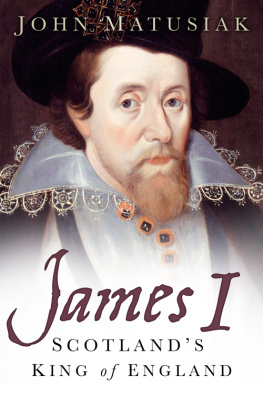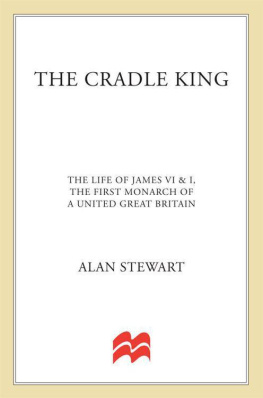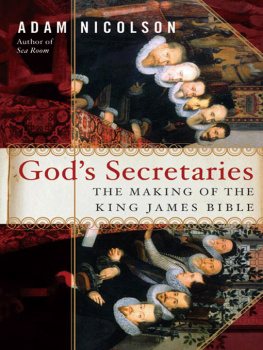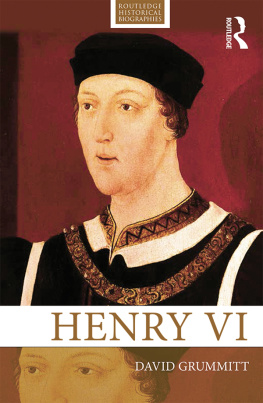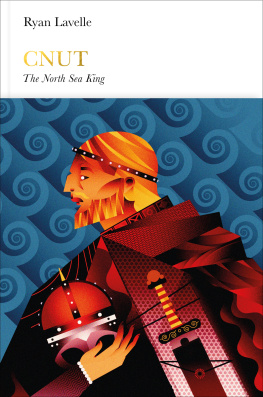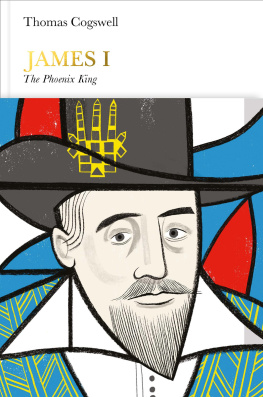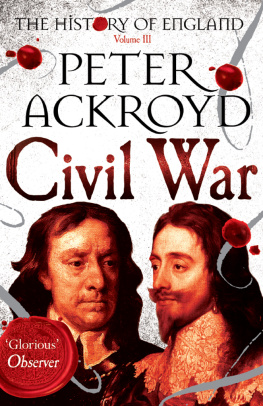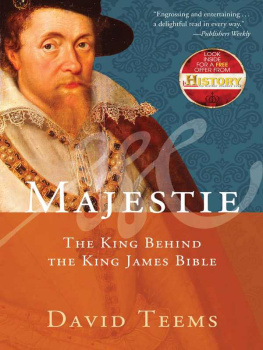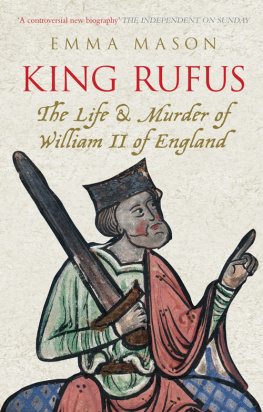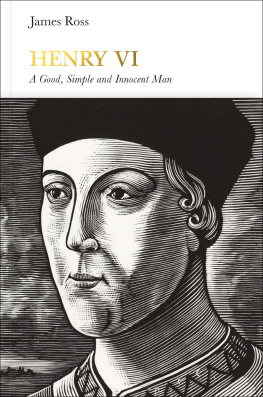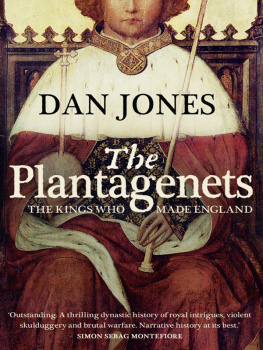
For my father
Biographers old and new, academic and otherwise, have been instrumental in shaping this book. Its earliest influences were David Harris Willson, George Philip Vernon Akrigg, William McElwee and Caroline Bingham. Later, as perspectives on its central character evolved, the book drew added inspiration from the work of a long list of others, but most notably Maurice Lee, Jr.
No writer is an island, and least of all this one. My thanks, therefore, are due to all those who have paved the way in their writings, as well as the smaller group of people who have supported me more personally in my efforts. In this latter respect, the help and encouragement of Mark Beynon, Juanita Hall and the team at The History Press has been unstinting, while Barbara, my wife, has continued throughout to hearten, uplift and cheer. To all concerned, I raise my glass.

Look not to find the softness of a down pillow in a crown, but remember that it is a thorny piece of stuff and full of continual cares.
James I, Meditations of Matthew 27
Contents
No more tears now. I will think upon revenge.
Words attributed to Mary Queen of Scots by Claude Nau de la Boiselliere, her confidential secretary from 157586
I n the mid-morning of 19 June 1566, Mary Queen of Scots was gratefully delivered of her first and only live-born child in a tiny closet tightly lodged in the south-east wing of Edinburghs ancient castle. Her labour had, it seems, been long and arduous, and ten days earlier, plainly fearing the worst, she had written her will. At that time, too, she had sent to Dunfermline Abbey for a sacred reliquary containing the skull of St Margaret, set in silver-gilt and enriched with several pearls and precious stones, which she intended to sustain her throughout the ordeal to come. Accordingly, as Mary endured the torment within her chambers sombre panelled walls, the remains of the saint a Catholic queen of Scotland like herself duly loomed above her, along with the arms of the House of Stuart and a series of embossed crowns and thistles adorning the ceiling overhead. Beside her all the while stood Margaret Asteane, her midwife, specially garbed for the occasion in a brand new gown of black velvet, not far from the royal cradle, which was likewise draped in finest fabric.
By 11 a.m., however, the midwifes task was ended. For the queen was lighter of a bonny son whom, she promptly predicted, shall first unite the two kingdoms of Scotland and England. The boy had entered the world, like Napoleon after him, with a fine caul, or birth membrane, covering his head an augury, it was said, of future greatness and his mothers lofty hopes seemed far from fanciful, since her royal cousin across the Border was, of her own admission, but a barren stock. If, therefore, Elizabeth I should now die childless, or if any plot against her life were to run its fatal course, Scotlands queen was not only the obvious female successor in her own right, but, much more importantly still, the bearer of a healthy male heir. And the blood of Marys son, directly drawn from Henry VII through both his parents, was of plainly purer stock than any other rival.
All, then, was swiftly set for outward rejoicing throughout the northern kingdom, though not before Marys secret messenger, Sir James Melville, was safely past the Border at Berwick on route hotfoot to London. Thereafter, nobles, officers of state and common folk alike gave solemn thanks in Edinburghs Great Kirk, as the castles mighty guns long a stirring symbol of national pride boomed their glad approval. Deputations and messages of goodwill arrived from far and wide, further couriers were dispatched to France and Savoy, and loyal toasts were heartily raised to Scotlands fledgling Solomon. Later that night, 500 bonfires would blaze on Scottish hillsides, as all the due and proper customs associated with any royal birth were studiously observed.
But the mask and show of celebration was mainly sham, since Mary Queen of Scots was also Scotlands woe. It was not for nothing that she had shunned the comfort of Holyroodhouse as her birthing place and made instead for Edinburgh and the security it afforded. Nor were all the salutations she now received by any means sincere. Indeed, for most of the vested interests in her restless kingdom, the newborn child represented little more than a fresh and unwelcome complication of a political and religious situation already critically dangerous. Powerful sections of the nobility had hoped, for their own self-interested motives, that he might never be born, and the stilted congratulations of John Spottiswoode, the Lothian superintendent of the Protestant Kirk of Scotlands General Assembly, could not conceal his misgivings that the new heir would inevitably be baptised a Roman Catholic, with all that this entailed for the reformed religion that had made such rapid strides since its apparent triumph only six years earlier. Even the childs father, Henry, Lord Darnley, had already done his feckless yet malignant best to prevent the birth of the son who shattered his best chance of seizing the throne for himself.
It was Darnley, moreover, who had sedulously propagated the rumour that his wifes new son was merely the bastard offspring of David Riccio, her Italian secretary and musician, whom he had helped to murder in her very presence just four months previous. Jaundiced, jealous, vain and volatile resembling more a woman than a man and stricken by inner demons of his own devising, which he could neither tame by infidelity nor dowse with drink the queens husband was now a pox-ridden parody of the dashing blonde-haired lover who had first dazzled his bride only two years earlier as the properest and best proportioned long man that she had ever seen. Both Mary and Darnley knew, furthermore, that she too had been struck with great dread and in extreme fear for her life when Riccio met his end, even though, within hours of the new birth, the queens abject husband was once again reminding his wife of her subsequent promise to forgive and forget all.
But while the queen might dutifully forgive, forgetting was another matter. What if Fawsdonsyds pistol had shot? she had asked her husband, recalling that fateful night when a gun, which had allegedly refused to give fyr, had been pressed to her own breast by one of Darnleys accomplices. What wold have become of him [the child] and me both? Nor could she ever entirely quash those spiteful rumours propagated by her husband that would continue to shadow her sons legitimacy. It was vital to Mary, of course, that Darnley should swiftly undo as much of the harm he had already wrought with his loose and ill-intentioned tongue, and he was soon compelled to acknowledge the child in the presence of the queens half-brother, the Earl of Moray, as well as the earls of Mar, Atholl and Argyll, and her Privy Council. Yet the queens caustic quip to her husband that he is so much your son that I fear for him hereafter would never entirely convince the world at large or spare her heir the barbs of neer-do-wells in years to come. As a child, indeed, the boy would weep in mortification at the slander, and the occasional taunts of the Scottish mob did nothing to ease his misery. Come down, thou son of Seigneur Davy, a baying Perth rabble would jeer in 1600 as he stood at the window of Ruthven House, and much later still, the King of France would chuckle at the boy who had by then become both James VI of Scotland and James I of England, dismissing his fellow ruler as Solomon the son of David who played upon the harp. There were even creeping whispers that Marys child had died at birth, to be replaced by a child of John Erskine, Earl of Mar empty legends which were nonetheless given a further lease of life in the eighteenth century when the skeleton of a newborn child, wrapped in a rich silken cloth belonging to Mary Stuart, Queen of Scots, was uncovered in a wall of Edinburgh Castles banqueting hall next to the castle courtyard.
Next page
